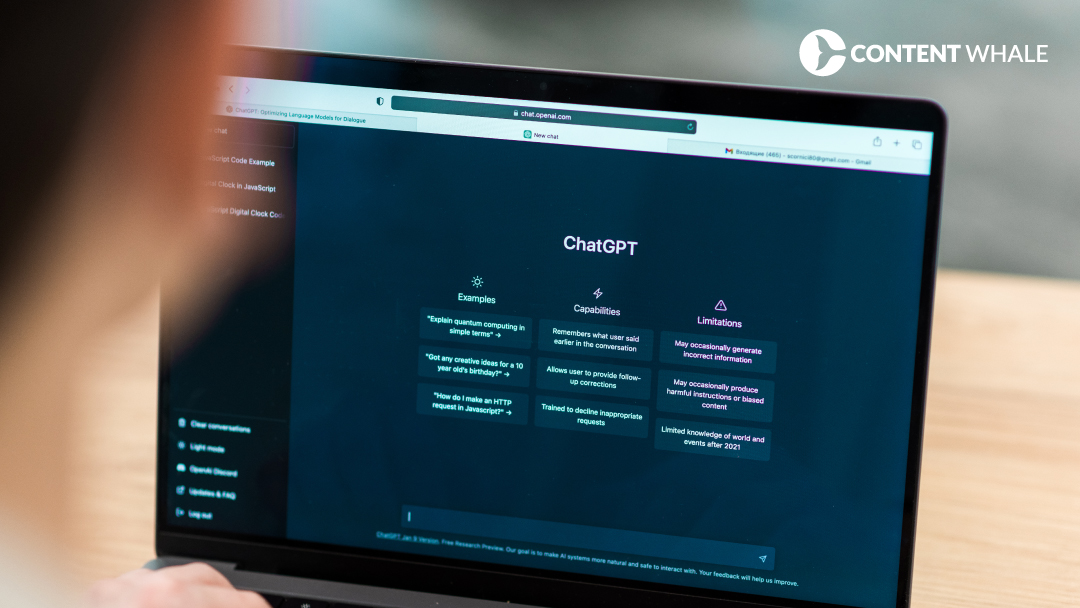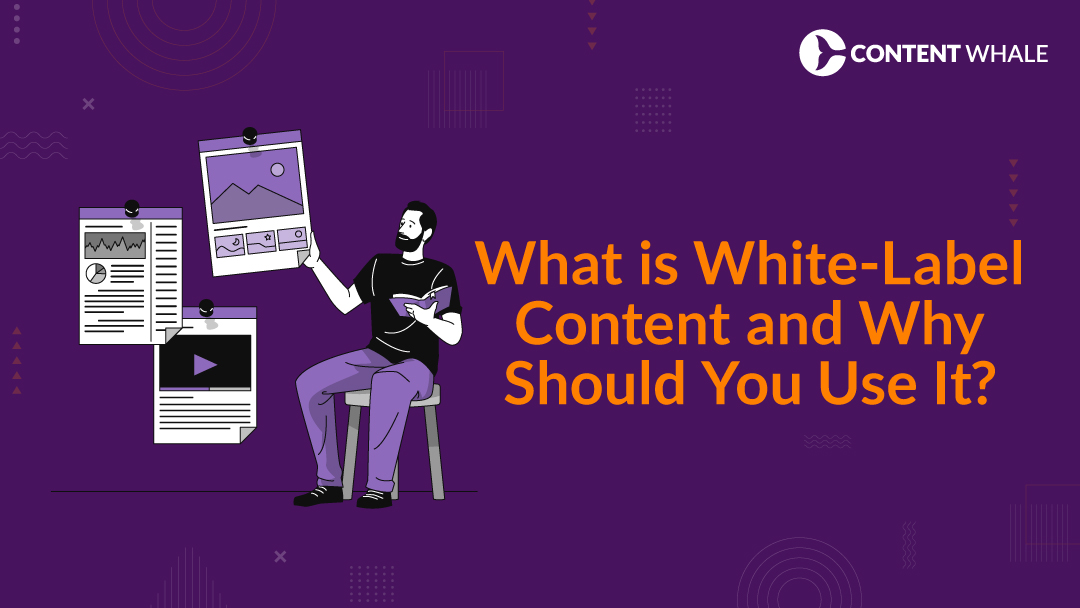Content marketing is increasingly recognized as a powerful strategy for business growth. Studies show that companies which maintain regular blogging schedules generate 67% more leads and garner 97% more backlinks than those that do not engage in consistent content creation (contentatscale.ai, blog.hubspot.com). This data underscores the critical role that strategic content plays in enhancing online visibility and driving business engagement. In this dynamic digital environment, white-label content emerges as a vital tool for businesses aiming to enhance their market presence without the overhead of creating content in-house.
What is White-Label Content?

So, what is white-label content? Simply put, it refers to content that is produced by one company but branded and used by another.
This means that if you purchase white-label articles or white-label blog content, you can present it as your own, maintaining coherence with your brand’s voice and style. For example, imagine a marketing agency that outsources article creation for a client’s campaign.
The agency purchases white-label content writing services, receives the completed content, and publishes it under the client’s name. This approach not only saves time but also ensures that the agency can provide a consistent content stream, matching the client’s branding and quality expectations.
What are the Benefits of White-Label Content?

The advantages of integrating white-label content into your business strategy are manifold. Primarily, it offers cost efficiency by eliminating the need for in-house content production teams, which can be expensive and resource-intensive.
Moreover, white-label content creation supports scalability, allowing businesses to increase content output or scale down as needed without altering their operational structure.
Businesses leveraging white-label content marketing can also see enhanced brand authority as they are able to offer high-quality, expert content that meets the needs of their audience.
Various business models can significantly benefit from adopting white-label content. Marketing agencies often use white-label services to manage large volumes of content for multiple clients.
E-commerce platforms can enhance their product descriptions and marketing materials with professionally written white-label articles. Similarly, Software as a Service (SaaS) companies can utilize bespoke content to explain complex products in a simpler way, enriching customer understanding and engagement.
Each application of white-label content is designed to meet specific business needs while maintaining a high standard of quality and relevance.
Understanding White-Label Content Services

Businesses today are increasingly turning to white-label content services to streamline their content marketing efforts while maintaining a strong brand identity. These services encompass a range of content types, each tailored to meet specific marketing goals and audience needs.
1. Types of White-Label Content Services
The spectrum of white-label content services is broad, offering solutions for nearly every aspect of content marketing. Businesses can access white-label blog content, detailed white-label articles, persuasive website copy, engaging social media content, informative email marketing campaigns, and comprehensive white papers. Each type of content serves a unique purpose:
- White-label blog content and articles enhance SEO and provide valuable information to the audience.
- Social media content aims to engage users and increase brand visibility on platforms where the audience spends a significant amount of time.
- Email content nurtures leads and keeps your audience informed about the latest offerings and insights.
- White papers position your company as a thought leader, presenting in-depth knowledge on specific topics.
2. The White-Label Content Creation Process
White-label content creation typically follows a structured process to ensure that the final product aligns perfectly with client specifications. This process includes:
- Initial Consultation: Providers work with clients to understand their brand voice, target audience, and content goals.
- Project Briefing: Detailed discussions about content types, themes, and deadlines ensure that providers fully grasp the project requirements.
- Content Creation: Skilled writers and marketers craft content that reflects the client’s brand and appeals to their target demographic.
- Revisions: To guarantee client satisfaction, most white-label content providers offer revisions to refine the content as per feedback.
- Delivery: The final content is delivered for client use, often with suggestions on how best to deploy it for maximum impact.
3. Finding the Right White-Label Content Provider
Choosing the right provider is critical to the success of white-label content marketing. When selecting a white-label content provider, consider their experience in your industry, their portfolio of successful projects, and their ability to understand and adapt to your brand’s voice.
It is also wise to review their content quality standards, turnaround times, scalability options, and customer service excellence. Providers that offer additional insights, such as performance analytics and strategic content planning, can add substantial value beyond mere content creation.
Incorporating white-label content services into your marketing strategy can significantly enhance your content efforts, making them more effective and less resource-intensive.
By partnering with the right provider, businesses can not only maintain a robust online presence but also advance their market position through professionally crafted content.
How to Use White-Label Content Effectively?

To truly capitalize on white-label content, businesses must integrate it seamlessly into their broader marketing strategies. This ensures the content not only fits with the brand’s image but also resonates with the intended audience, thereby enhancing engagement and conversion rates.
1. Integrating White-Label Content into Your Marketing Strategy
Successful integration of white-label content starts with a clear understanding of your marketing objectives and how this content will help achieve them. Here are steps to ensure white-label content marketing works effectively within your overall strategy:
- Align Content with Brand Voice: The content should mirror your brand’s tone and style to maintain consistency across all platforms.
- Understand Your Audience: Tailor your white-label content to meet the interests and needs of your target demographic. This might involve the content provider customizing it to better address specific audience segments.
- Choose the Right Distribution Channels: Whether it’s through email marketing, social media, or your company blog, selecting the right channels is crucial to getting your content in front of the right people.
2. Content Repurposing Strategies
One of the significant advantages of white-label content is its versatility. Here are some innovative ways to repurpose your content to extend its reach and effectiveness:
- Blog to Video: Transform white-label blog content into engaging videos, which can be shared on platforms like YouTube or embedded in your website.
- Articles to Infographics: Convert key points from your white-label articles into infographics, which are perfect for sharing on social media and improving engagement.
- White Papers to Email Series: Break down comprehensive white papers into digestible email content that provides value to subscribers over time.
3. Measuring the Success of White-Label Content
It’s essential to track the performance of your white-label content to understand its impact and refine your strategy. Use tools to monitor key metrics such as:
- Website Traffic: Assess how much traffic white-label content brings to your site and how visitors interact with it.
- Lead Generation: Track how effectively the content converts readers into leads.
- Engagement Rates: Use likes, shares, and comments to gauge the engagement of your content on social media.
By strategically integrating and repurposing white-label content, businesses can enhance their marketing efforts and achieve better ROI from their content investments. Continuously measuring these efforts will help fine-tune the strategy and achieve the desired marketing outcomes.
Emerging Trends in White-Label Content

The digital marketing field is continually adapting to new technologies and consumer behaviors, influencing how white-label content is utilized and created. Staying ahead of these trends is essential for businesses looking to optimize their content strategies for maximum impact and relevance.
1. Rise of AI-Powered Content Creation
One significant trend shaping the future of white-label content marketing is the integration of artificial intelligence.
AI technologies are increasingly used to generate content, from simple blog posts to more complex reports, enhancing both the efficiency and the scalability of white-label content creation.
This technological advancement allows for quicker turnaround times and can help in maintaining a consistent content quality, even under tight deadlines.
2. Demand for Personalized Content Experiences
Today’s consumers expect content that is not only relevant but also highly personalized.
This trend is pushing white-label content providers to offer solutions that tailor content to the individual needs and preferences of an audience.
Personalization can significantly increase engagement rates, as content that resonates personally with readers is more likely to inspire action and loyalty.
3. Growth of Video and Interactive Content
Another trend gaining momentum is the increasing demand for video and interactive white-label content.
Videos continue to dominate social media with their high engagement rates, while interactive content such as quizzes and polls can significantly boost user interaction and data collection efforts.
These formats offer dynamic ways to present white-label content, making it more engaging and effective in capturing the audience’s attention.
4. Strategic Consulting and Data-Driven Solutions
As the market for white-label content evolves, providers are now offering more than just content creation—they’re stepping into roles that involve strategic consulting and data-driven marketing solutions.
This shift means that white-label content services are becoming more integral to overall marketing strategies, providing businesses with insights and analytics to refine their content deployment and maximize ROI.
5. Integration with Marketing Automation Platforms
The seamless integration of white-label content with marketing automation platforms represents a significant efficiency boost.
This integration allows for the automatic distribution of content across various channels, ensuring timely and targeted content delivery.
It also enables more sophisticated tracking and analytics, helping marketers measure the effectiveness of their content and adjust strategies in real-time.
These emerging trends highlight the dynamic nature of white-label content marketing and the opportunities it presents for businesses aiming to enhance their digital presence and engagement.
By staying informed and adaptable, companies can leverage these trends to maintain a competitive edge in their respective industries.

As we wrap up this comprehensive guide, it’s clear that white-label content plays a pivotal role in contemporary marketing strategies. This type of content not only helps businesses scale their content efforts efficiently but also enhances brand consistency and authority without the significant overhead associated with content creation.
Businesses of all sizes can leverage white-label content to meet diverse marketing needs—from filling out a blog with engaging articles to supplying detailed white papers that underline industry expertise. Key benefits include:
- Cost Efficiency: By outsourcing content creation, companies save on the expenses of hiring in-house writers or purchasing high-end content creation tools.
- Brand Enhancement: Consistent, quality white-label content boosts a brand’s credibility and authority in its niche, which is essential for competitive industries.
- Scalability: As demand fluctuates, white-label content can be scaled up or down without disrupting a business’s core operations.
If your business is looking to streamline its content production or expand its content capabilities without substantial investment, exploring white-label content solutions is an advisable next step. Consider reaching out to reputable white-label content providers, such as Content Whale, to discuss how their services can align with your marketing objectives. Requesting quotes or even trial services can provide a clearer picture of how white-label solutions can fit into and benefit your overall strategy.
Remember, in the fast-paced world of digital marketing, staying ahead often means choosing strategic partnerships wisely—partnerships that include reliable and innovative white-label content services. These relationships can significantly enhance your marketing efforts, leading to better engagement, increased leads, and ultimately, greater business success.

Is white-label content considered plagiarism?
No, white-label content is not considered plagiarism. This type of content is legally created by one company and sold to another to use under its own brand name. As long as the white-label content provider owns the copyright and grants you exclusive rights to publish the content as your own, there is no issue of copyright infringement.
Can I resell white-label content?
Whether you can resell white-label content depends on the terms set by the provider. Some providers allow you to purchase content with resale rights, meaning you can sell the content to others. However, many providers restrict the use of their content to your own brand only. It’s essential to review the contract or agreement to understand the specific rights granted.
How much does white-label content cost?
The cost of white-label content varies based on several factors, including the type of content, the length, the complexity, and the expertise of the content provider. Prices might range from as low as $0.05 to over $1.00 per word for content that requires a high level of specialization or expertise.
Do I need to provide any information when ordering white-label content?
Yes, when ordering white-label content, you typically need to provide detailed information to ensure the content aligns with your branding and marketing goals. This information may include details about your target audience, the objectives of your content, your brand’s voice, and specific keywords you want to target. This helps the provider create content that is tailored to your needs.
What happens if I’m not satisfied with the white-label content?
If you are not satisfied with the white-label content you receive, reputable providers usually offer a revision policy. It’s important to understand the provider’s revision process and limitations before placing your order. This ensures that any issues with the content can be addressed to meet your expectations.
Can I use white-label content for social media marketing?
Absolutely! White-label content can be effectively used for social media marketing. It can be repurposed into various formats, such as social media posts, infographics, or video scripts. This flexibility allows you to extend the reach and impact of your content across different platforms, enhancing your social media engagement and presence.





